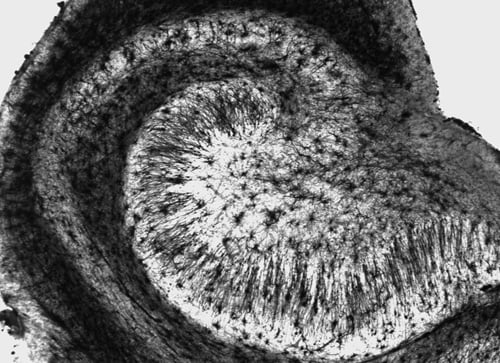Hippocampal Atrophy Seen with Early Cognitive Decline in Parkinson’s Disease
Atrophy in the hippocampus, the region of the brain known for memory formation and storage, is evident in Parkinson’s disease (PD) patients with cognitive impairment, including early decline known as mild cognitive impairment (MCI), according to a study by researchers in the Perelman School of Medicine at the University of Pennsylvania. The study is published in the December issue of the Archives of Neurology, one of the JAMA/Archives journals.
First, using traditional imaging analyses, researchers found that Parkinson’s patients with MCI had more atrophy in the hippocampus, basal ganglia, amygdala, and insula compared with Parkinson’s patients with normal cognition, whereas Parkinson’s patients with normal cognition showed no significant loss of brain volume compared with healthy controls. For Parkinson’s patients with full-blown dementia, atrophy was present not only in the hippocampus but also the surrounding medial temporal lobe, also crucial to memory and other cognitive abilities.
Then researchers generated the first structural pattern of classifying brain atrophy associated with dementia in Parkinson’s disease by analyzing the scans of PD with either dementia or normal cognition.
“When we layer different information gathered from structural MRIs and generate a structural pattern that weighs different brain regions on their ability to distinguish PD with dementia from those with normal cognition, we can see a pattern of diffuse gray matter and white matter atrophy in the brains of Parkinson’s patients with cognitive decline,” explains the study’s lead author, Daniel Weintraub, MD, associate professor of Geriatric Psychiatry with Penn’s Perelman School of Medicine and the Philadelphia Veterans Affairs Medical Center. “This complex analysis of brain imaging data suggests that it is possible to detect a wide range of brain atrophy at the initial stages of cognitive decline in patients with Parkinson’s disease, which has not been reported previously.”
As Parkinson’s-related mild cognitive impairment (PD-MCI) is increasingly recognized as an important clinical syndrome of possible precursor of Parkinson’s dementia, biomarkers with good screening or diagnostic validity can help categorize levels of cognitive impairment, may predict future cognitive decline, and may ultimately help inform treatment decisions.
The neurodegeneration that contributes to cognitive decline seen in Parkinson’s, particularly in regions of the brain known to play a role in Alzheimer’s disease, such as the hippocampus, is likely due to a “complex interaction of different disease pathologies,” the researchers said. Approximately 80 percent of Parkinson’s disease patients ultimately develop dementia.
Parkinson’s patients with normal cognition showed no atrophy and had similar brain volumes to healthy controls without Parkinson’s or cognitive impairment. Therefore, researchers believe that significant brain atrophy in areas subserving cognition does not occur in Parkinson’s disease without a comorbid cognitive impairment.
Eighty-four Parkinson’s patients from the Penn Parkinson’s Disease and Movement Disorders Center and 23 healthy controls received MRIs of the brain. Of the 84 Parkinson’s patients, 61 had normal cognition, 12 were classified as having mild cognitive impairment, and 11 were diagnosed with Parkinson’s disease dementia.
The research team included Dr. Weintraub, Jimit Doshi, MS, Deepthi Koka, MS, Christos Davatzikos, PhD, Andrew Siderowf, MD, MSCE, John Duda, MD, David Wolk, MD, Paul Moberg, PhD, Sharon Xie, PhD, and Christopher Clark, MD, representing the Penn Udall Center for Parkinson’s Research and the Perelman School of Medicine’s departments of Psychiatry, Neurology, Radiology, Biostatistics and Epidemiology. Dr. Weintraub and Dr. Duda are also with Philadelphia Veterans Affairs Medical Center. Dr. Clark is with Avid Radiopharmaceuticals.
The study was funded by grants from the National Institutes of Health’s National Institute of Neurological Disorders and Strokes and National Institute of Aging, as well as a grant awarded by Department of Health of the Commonwealth of Pennsylvania from the Tobacco Master Settlement Agreement.
Notes about this memory research article
Contact: Kim Menard – Penn Medicine
Source: Penn Medicine press release
Image Source: Neuroscience News image adapted from image uploaded by MethoxyRoxy at WikiMedia Commons.








